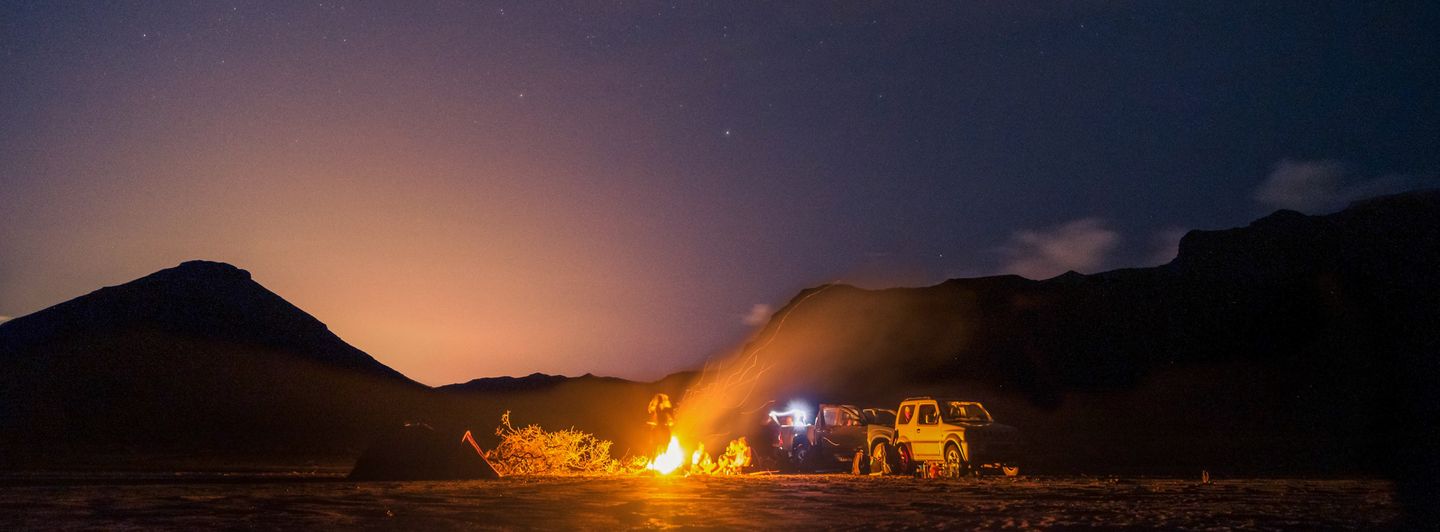I decided to start the year 2022 in a new country.
That was it, in January I was flying to my new home in S. Vicente for two months.
Overall, it was an incredible experience, but as with everything in life, it has prettier and uglier sides.
It was a different way of being a tourist, and I wanted to document everything.
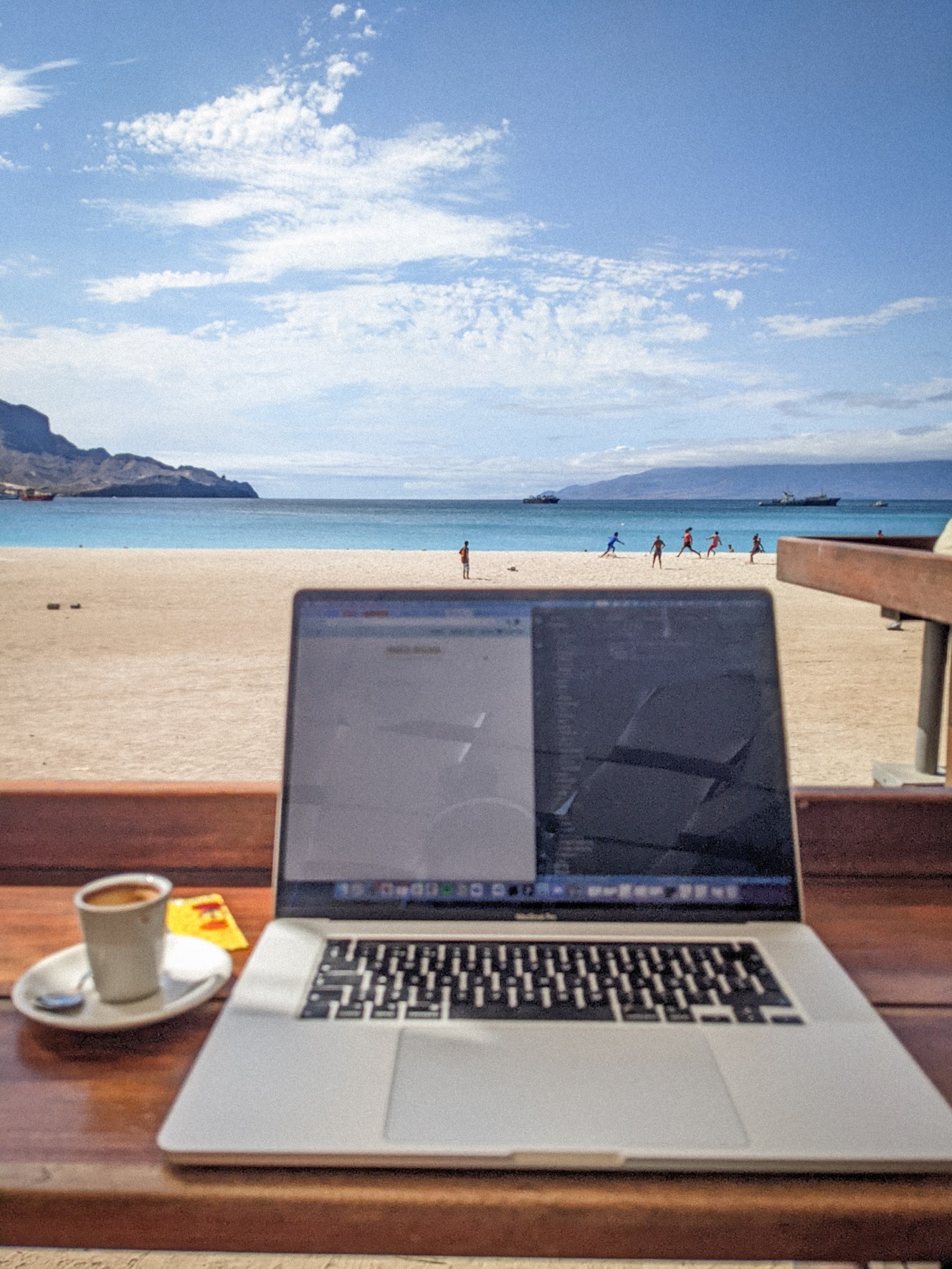
How did the Idea Start
One day, when I was scrolling on my Facebook, I saw an advertisement that caught my attention.
“Come and enjoy the island lifestyle”, I click and I lead to this website.
From the website, I clicked on ‘Register.’
I filled out the registration form, and an email landed in my inbox.
It informed me about an existing co-working space on the island and shared a link to a discord community. The latter was a great platform to get into - it increased the excitement of planning to go after knowing that more people would be there living the same experience.
That was it, in October of 2021 I was requesting my passport for the first time. The month after we were booking an Airbnb in S. Vicente and we were buying our flight tickets.
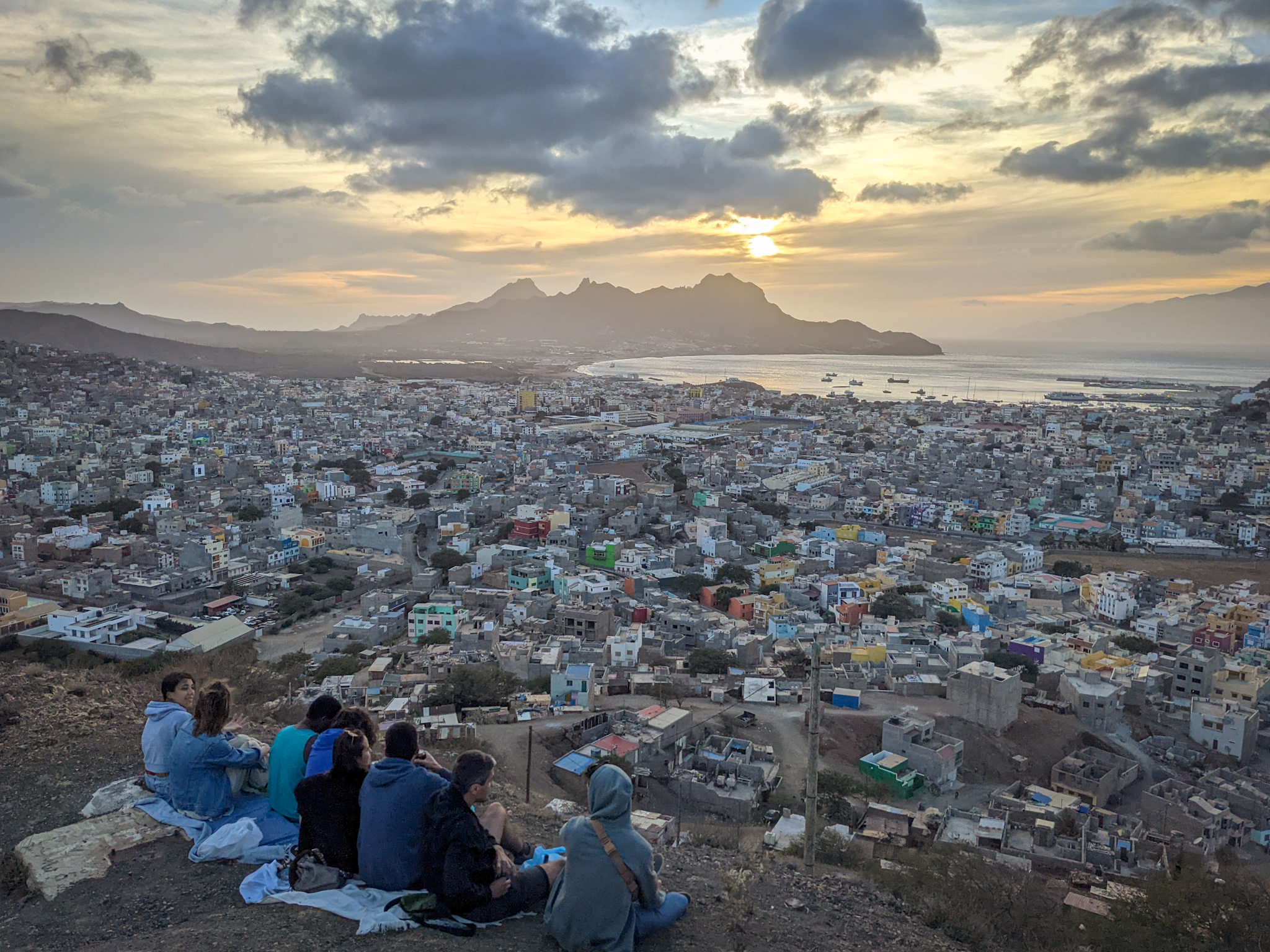
About the Country
Cape Verde is the most western point of Africa. It is composed of 9 inhabited islands and one uninhabited.
Portuguese sailors discovered the archipelago, which remained a Portuguese colony until 1975. The official language is Portuguese. Therefore, there were no communication barriers for us, except if they would speak creole, which they often do in their daily life.
Why did I Choose it and Where did I Stay
Choosing this country started by getting to know that there was a program targetting remote workers, so I knew that I would find like-minded people.
The other reasons were - the country has warm and sunny weather, it has a similar timezone similar to the European one, and it has accessible prices.
We stayed in S. Vicente, the cultural capital of the country. You realize that right away when you arrive and see that their airport is named Cesária Évora, an iconic singer born on the island, also known as the queen of Morna (Cape Verdean music genre).
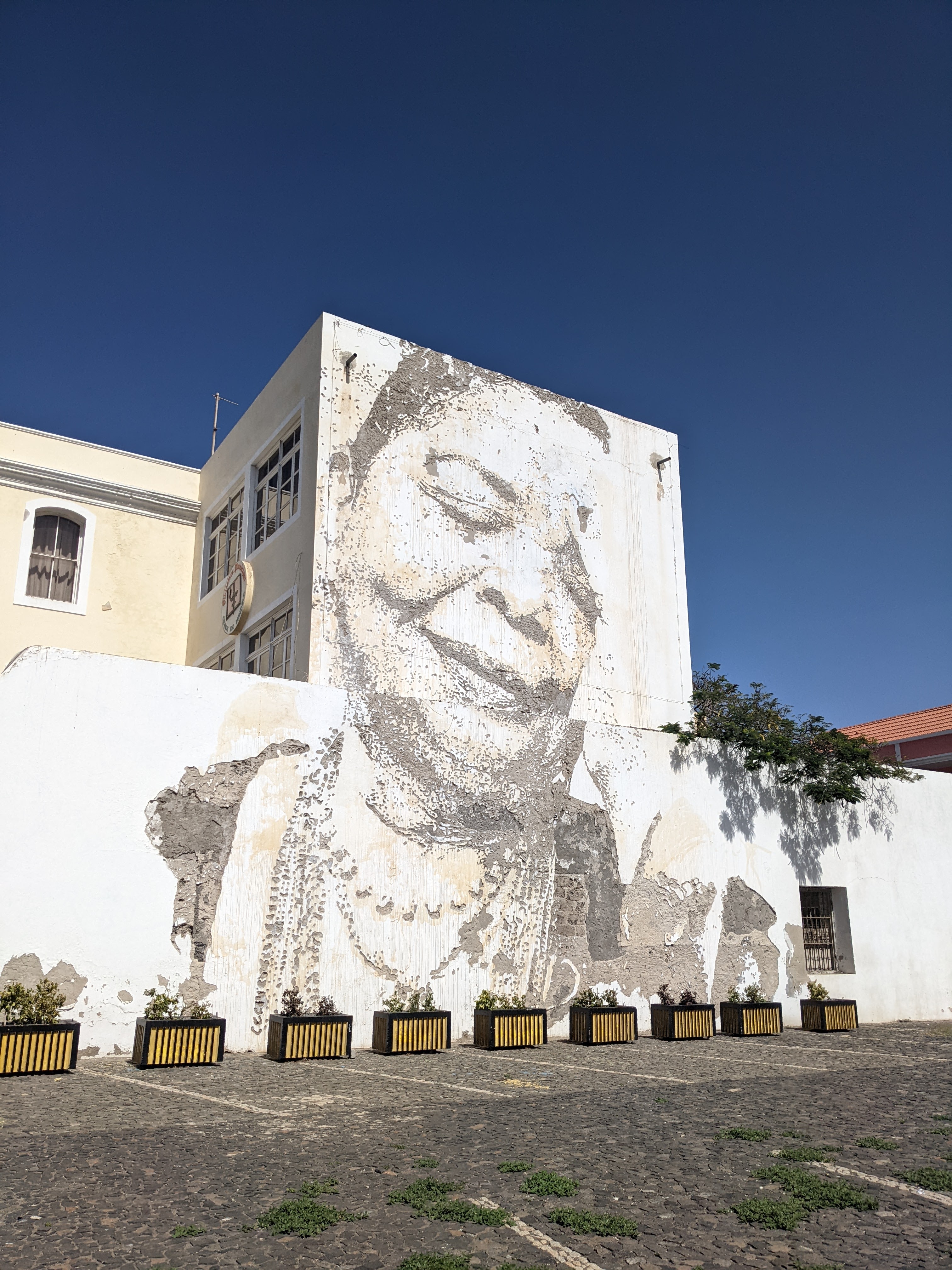
The music is really present on the island, there are several live music bars, and a recording studio/ bar - Mansa Floating Bar (it was my favorite, and we got a bit obsessed with their kiwi caipirinhas 😂).
The other islands
We got the chance to visit other islands - Santo Antão, Santa Luzia (the uninhabited one), and Sal. I would categorize them like this:
Santo Antão is for nature lovers. It is the greenest island. There I found a calm and friendly atmosphere. I think it makes a great hiking place.

Sal is for beach lovers. It is small, in one day you can get to see all of the main spots. What I loved the most was the beaches - soft sand, they had a lot of beach volleyball 🙌🏼 and less windy than S. Vicente (maybe being closer to continental Africa helps). Compared to S. Vicente, I immediately noticed a more significant amount of tourists, which maybe justifies that the prices were higher there.
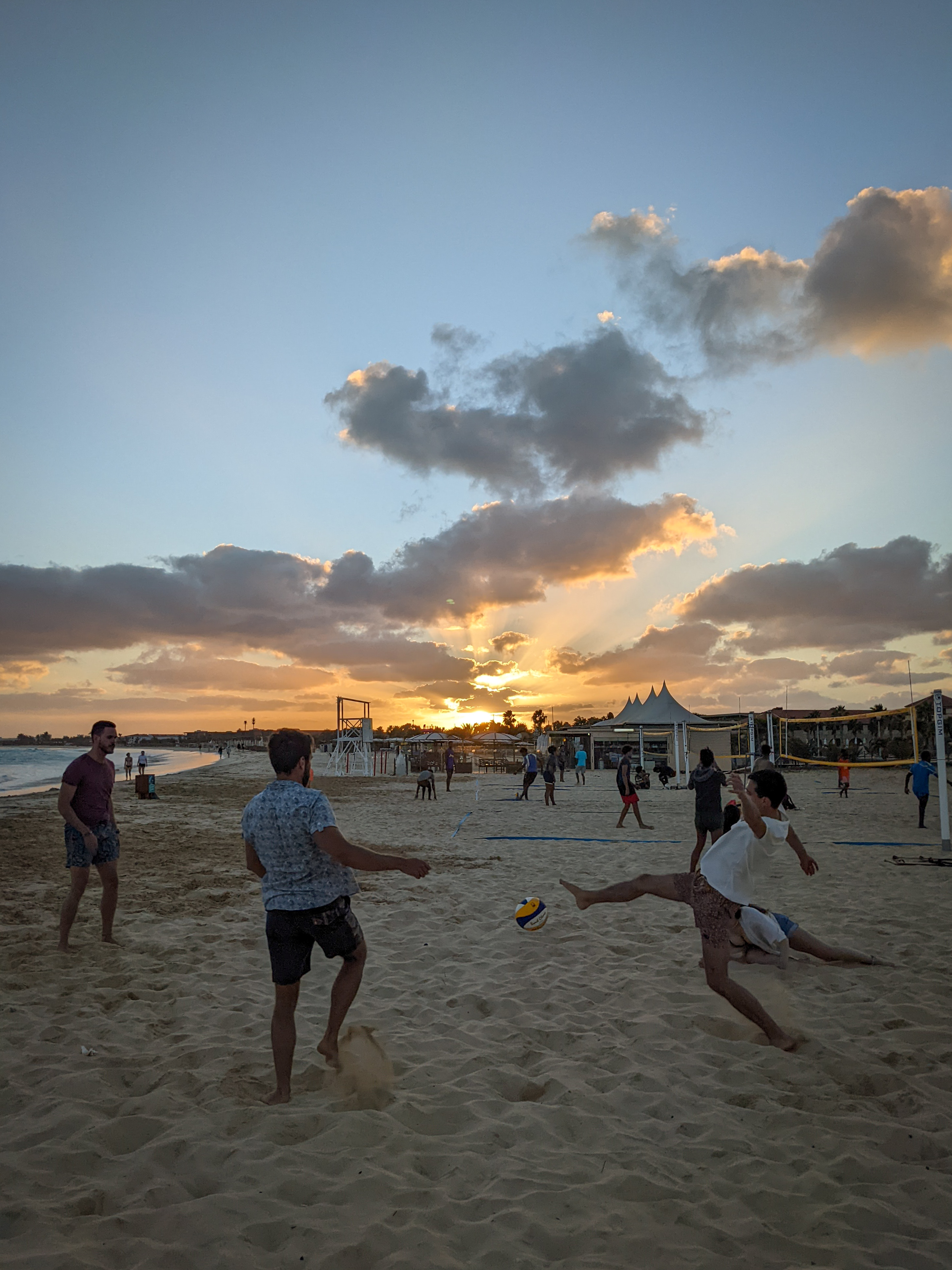
Santa Luzia has not much to see (obviously 😂). What I liked the most was the trip itself to reach there - it was 10h of a sailing boat trip from S. Vicente. Besides that, I think when you land on the island, the feeling of being in a completely desertic place is pretty unique.
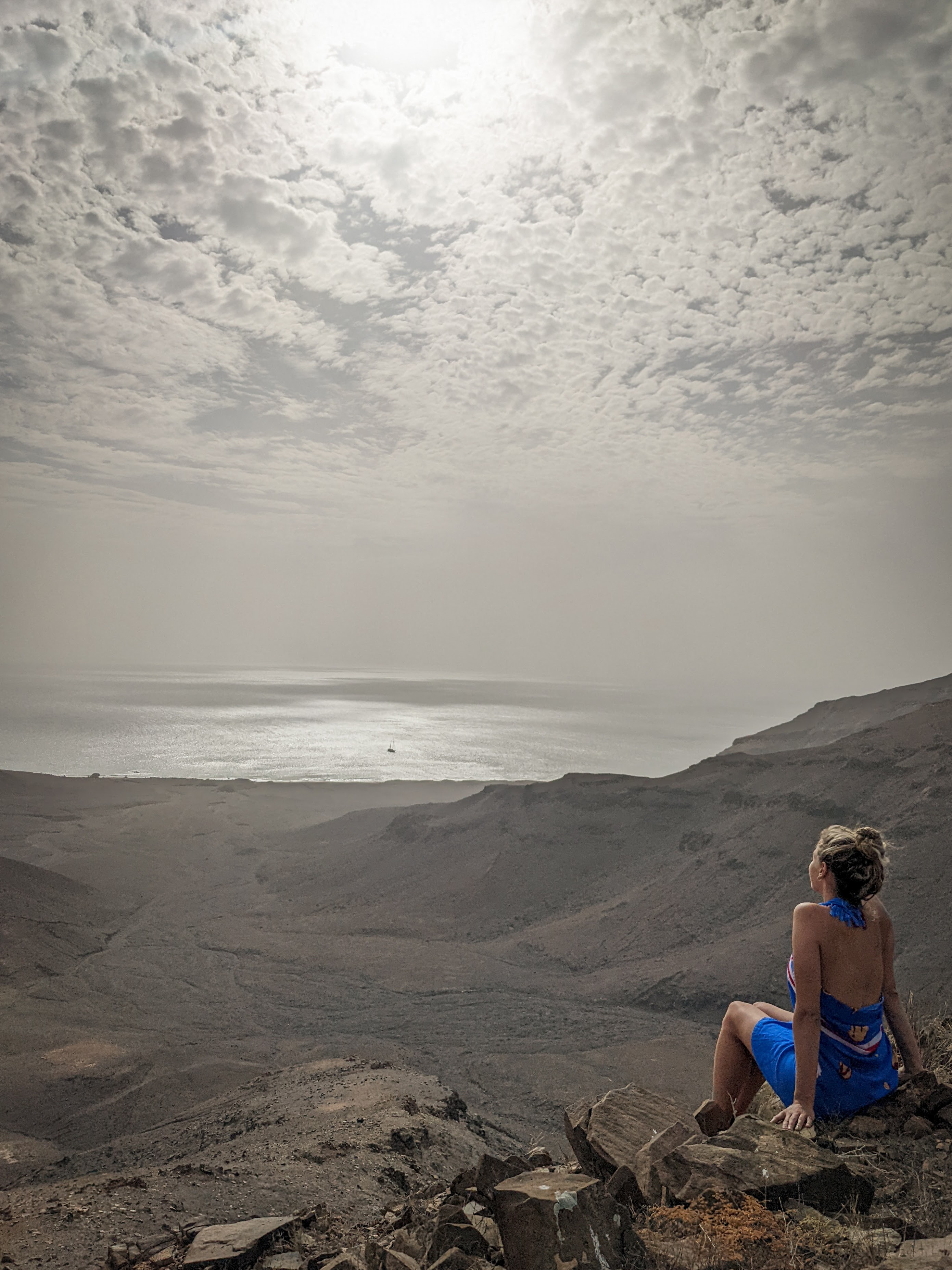
I think out of these, S. Vicente was the best choice for a long-term stay - it is less touristic, but it still has a lot going on. I think you get to experience more authentic and local vibes giving you a better understanding of life in the country. (but probably it will be for a short time, a Sheraton hotel was already under construction next to our BnB 😅).
I didn't get the chance to visit any Sotavento Islands (southern group of islands), such as Fogo, Brava, Santiago, and Maio.
Santiago has the capital, and I heard a lot of times from others that it was not a very safe island. Fogo produces fantastic wine. I loved their white wines - Sodade and Chã. Brava is also known as the flowers island. Maio is an island that will also grow more in tourism (according to our tour guide in Sal), and I think it must be pretty similar to Sal - great for the beach. These last two islands are harder to reach.
The two transportation methods we used to travel between islands were: ferry boat and plane.
Differences with Europe
Before Cape Verde, I always traveled within Europe, where countries tend to be similar to each other.
This was the longest time I spent away from Europe. However, I didn't feel a cultural shock. I just noticed some differences - more community spirit and happier people. These differences are probably a reflection of being a small city (~70 000 inhabitants) and having good weather all year round 😛
My routine
Moving to a new country often means your routine will change.
Here, I think I had my dream routine:
I start by waking up earlier (since the timezone is GMT-1) and having breakfast with the best balcony view I ever had 🌊; On the days I had fewer meetings, I would stay at home and have my lunch break at the beach.
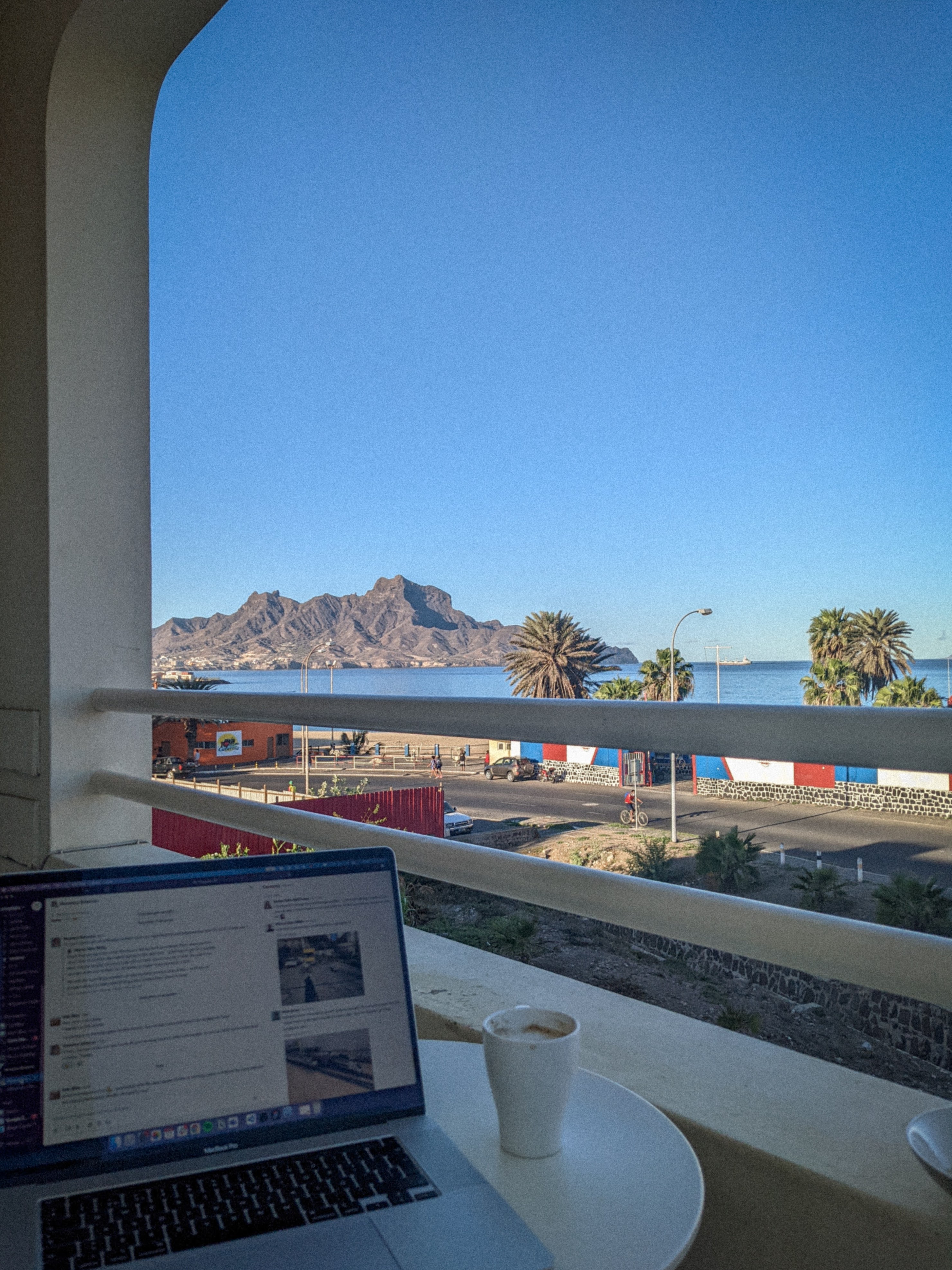
For lunch, we discovered a local “restaurant,” aka a container where the construction workers would go for lunch = large plates of homemade food for 2/3€, served quickly.
As a good Portuguese, I like to have my after-lunch coffee, so I often worked from the beach bar in the afternoon.
On the rest of the days (2/3 days of the week), I would go to the co-working space the whole day, and have lunch somewhere in the center.
At the end of the workday, I would workout at the beach, doing weight-lift with rocks 😂🏋🏼♀️
We would cook something for dinner or go out to a restaurant in the evening. I never ate so much tuna - my favorite plate was from Café Mindelo, where they served tuna with sesame seeds, vegetables, and brazed potatoes.
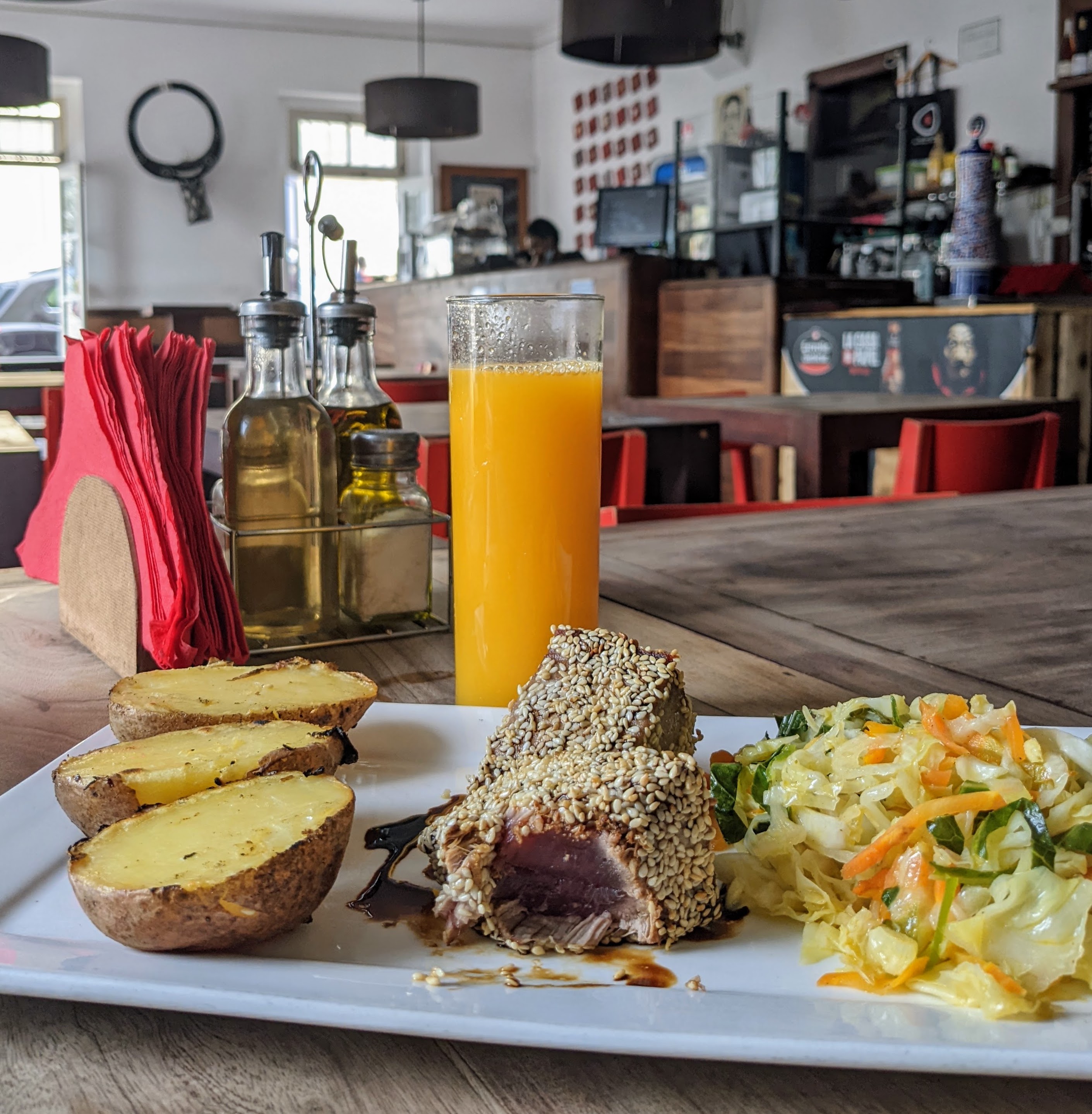
The restaurant from the docks was my preference for lunchtime because I could catch the sun while having my favorite meal from them - sawfish with curry rice.
After dinner, we often went out for a drink with the community of other remote workers.
Something that I find cool is that a lot of times, we would have locals joining us for the after dinner reunions.
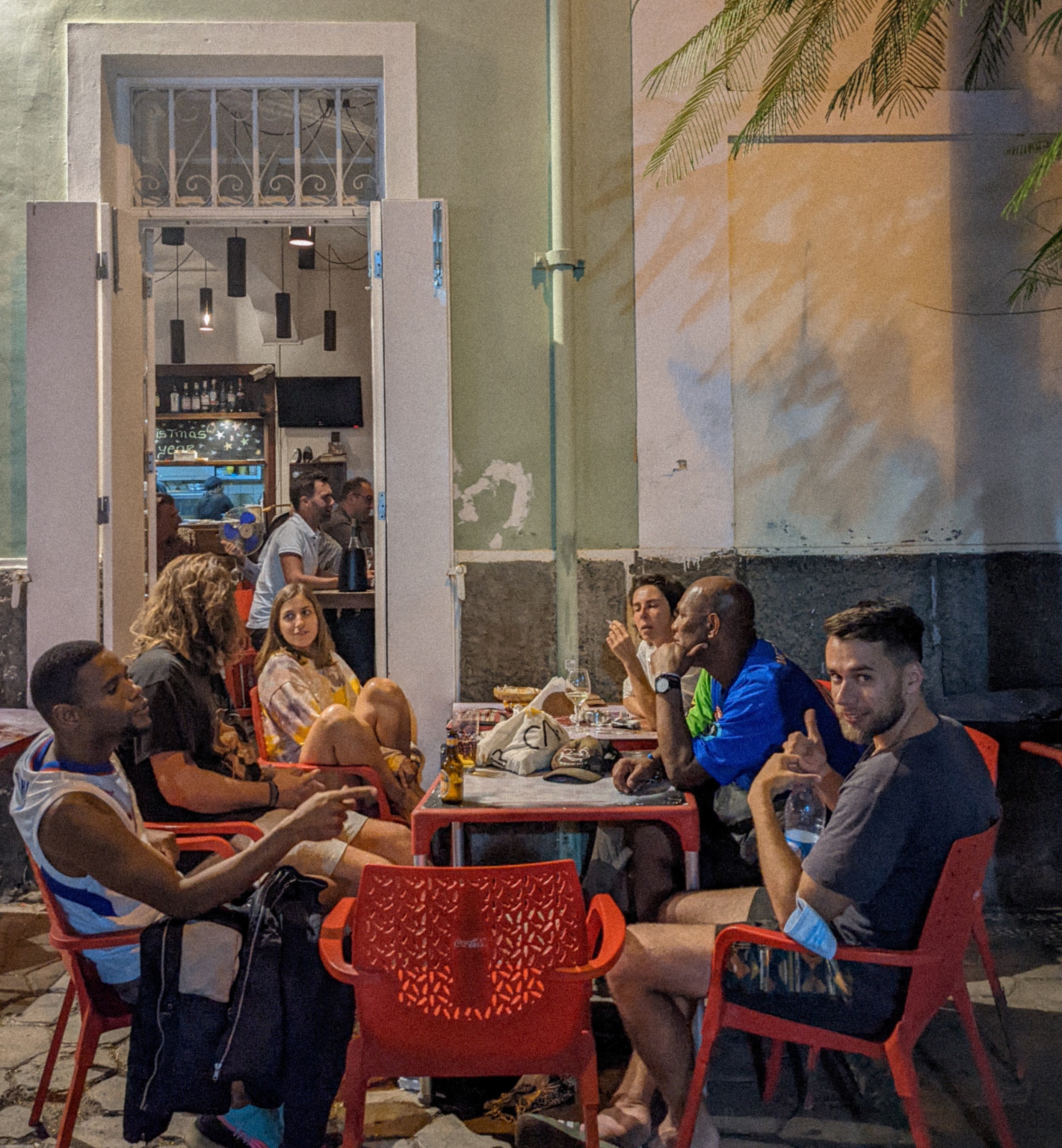
In our discord group, we actually had a local helping to organise activities with us.
Later in my stay, I started including more activities to my week, I joined a local crossfit group and I was attending Kizomba dance classes 💃🏼
The weekends felt like short vacations, where we often made longer trips, like visiting other islands.
Highlights
For me, this felt like doing an Erasmus program again (but without being broke 😂).
Hanging Out with other Remote Workers
I met many people from all over, and I think having this community living the same lifestyle improves the experience.
Two months was a reasonable time frame: the first month, I was exploring, and in the second, I started to feel like an inhabitant - I was going to my favorite places, and I had a more defined routine.
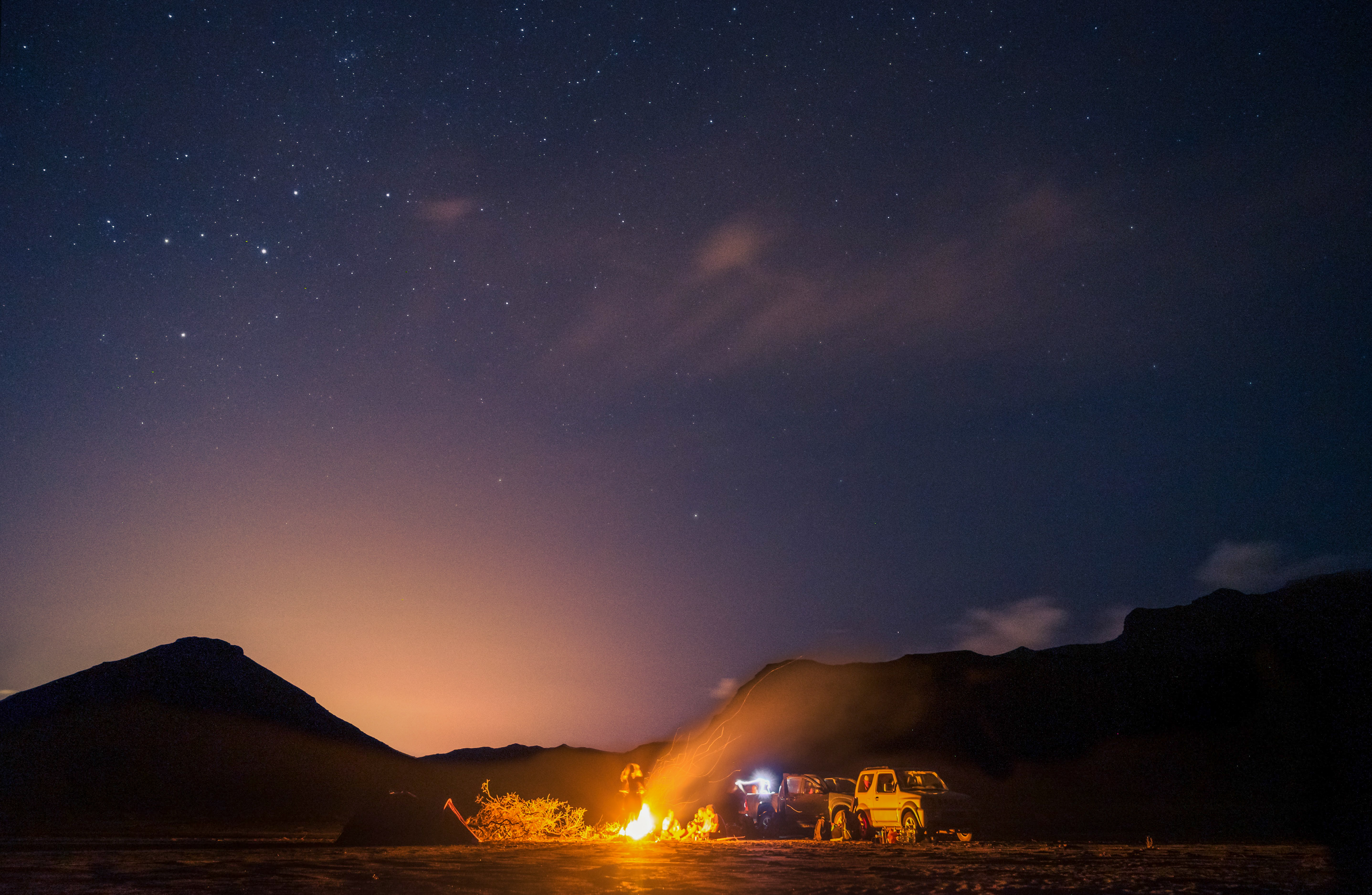
My favorite plan happened when we went for an off-road drive to reach a big desertic beach and spend a night there. We did all the cliches of a beach campfire - obviously, the bonfire first, singing Wonderwall on the guitar, watching the stars and the fluorescent plankton in the water.
Connecting with Locals
Connecting with locals, made me feel less like a tourist and more like an inhabitant.
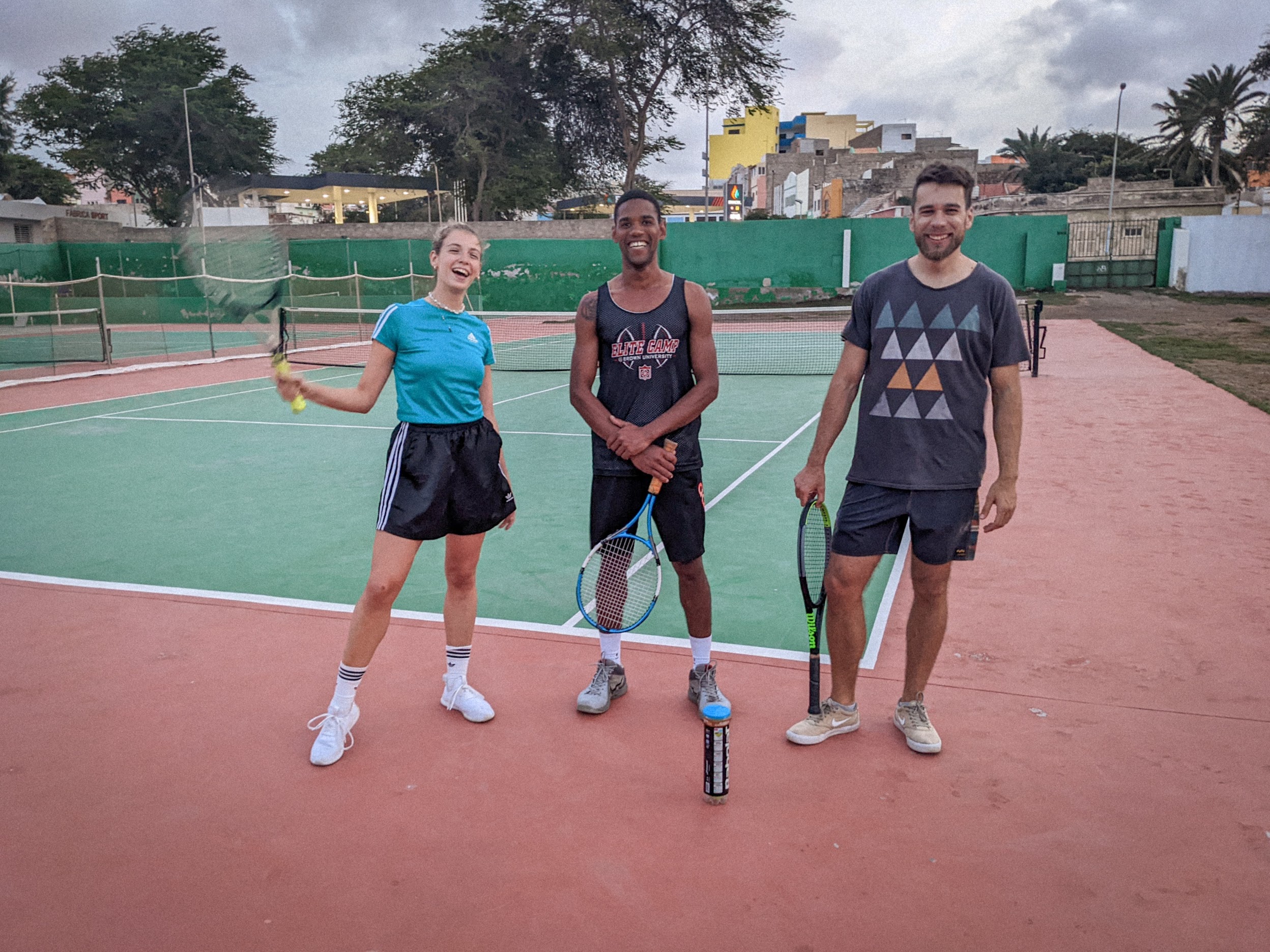
I think staying longer than a month was key for this to happen, added to the fact that locals are so easygoing and open to others.
How did this happen? The city is not big, so you end up going to the same places and bumping into the same people in the street. When we would go to the cafe Mindelo in the center, our table usually ended up with new people, a lot of them were locals, and with time you start making plans together.
Later in my stay, I start attending meetups with local companies, entrepreneurs, and artists. Anna has been a digital nomad for some years now, and she often publishes her experiences on LinkedIn. In one of the posts she did about her life in Mindelo, Cape Verde, she got in touch with employees at Chuva (a cape Verdean software house). Their interaction resulted in the idea of organizing meetups with other remote workers and locals. These meetups resulted in a very inspiring environment and I think it was a great initiative.
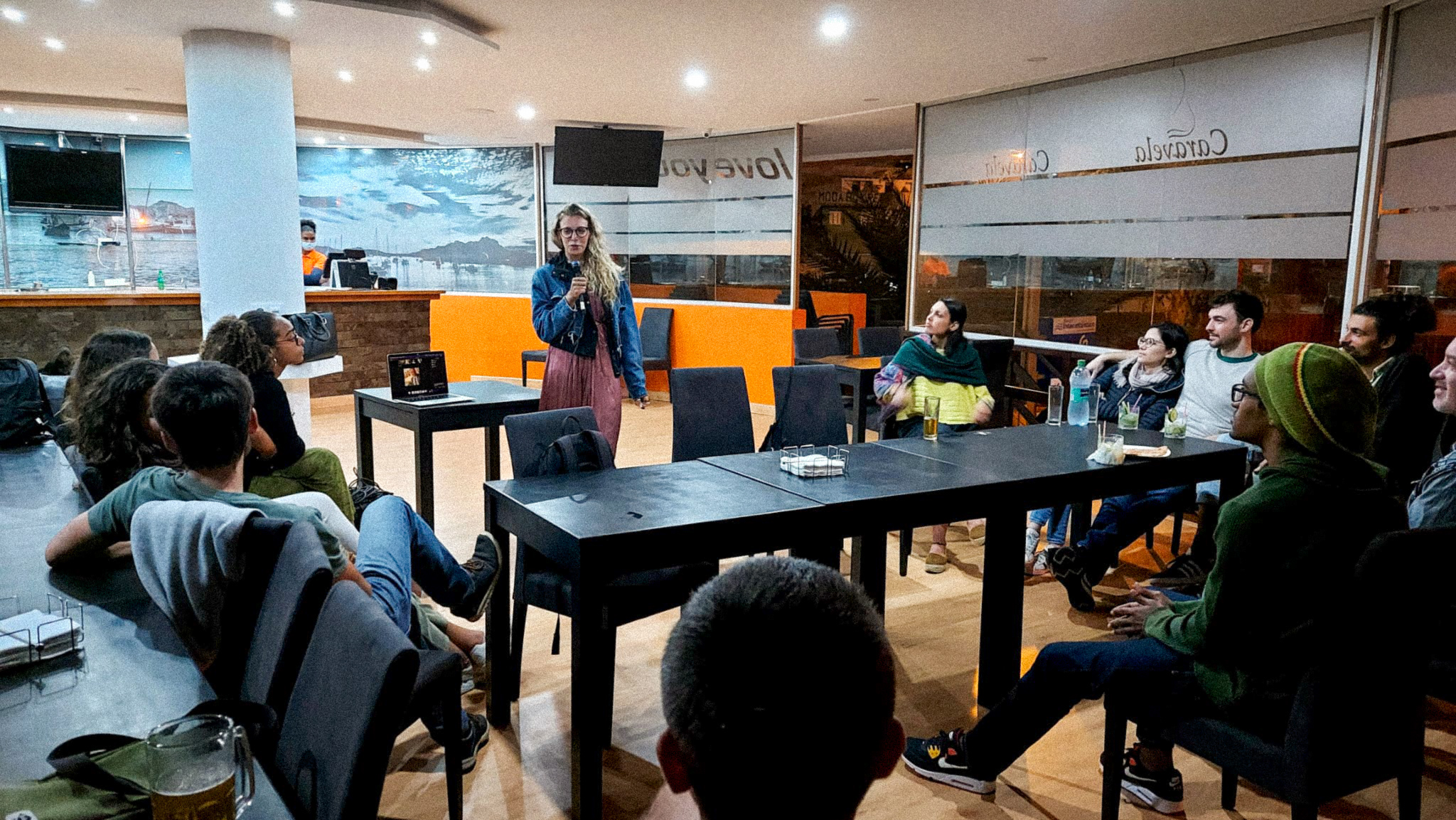
Besides that, we start organizing football matches and barbecues.
In general it was a positive experience. I loved my routine there and I would definitly go back.
Lowlights
I stayed from the middle of January till the middle of March.
Windy Months
We caught February, which I think is the peak of their winter.
Therefore, even though the temperature was still good (~21C), it would get very windy. During that month I wouldn't stay very long on the beach, the sand would hit you giving you a not-so-pleasant free exfoliation :)
Visa Beauracracy
To renew the Visa is pretty unorganized, they give you paper to go pay in the bank, the banks were always crowded, then you go back, they keep your passport and you can pick it up after 1 or 2 days. They close early (16H), but even if you go before is not certain you will get it, it happen to us that we went there around 15H and they said to us, that the ones dealing with Visas had already left 😅
Co-Working
The co-working space could be improved, I mean, it matched all the basic needs of a working space, however, when I compare it with the ones I have in Porto it is way too basic for the price they ask. For a fixed desk, the price was 150e (similar prices in Porto). I guess the reason behind the price was the fact it was the only co-working in town.
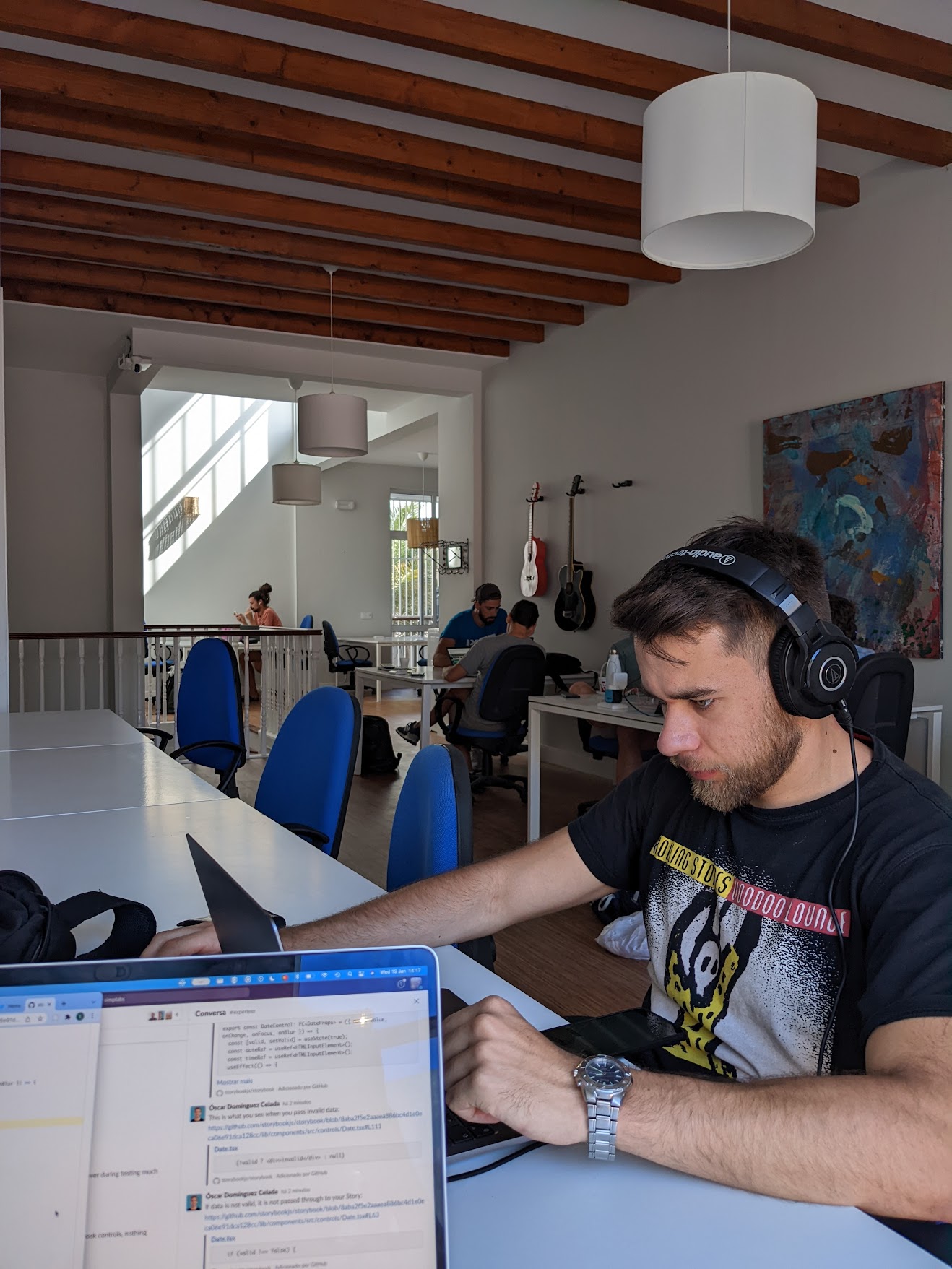
Being a Woman & Staying Alone
I definitely look like a tourist there and that doesn't help. Every time I would go back home alone during the day, I would hear guys shouting every minute. Some of my favorite punchlines were 'You have a beautiful mouth' or when they would do just noises 🙃
Other foreign women that were there experienced the same.
I never felt in danger but they could be very weird and inappropriate if you wouldn't put a barrier.
Some moments even make me laugh now - one time at night in a street in front of a bar, there was a guy that started smelling the hair of one of our friends & another situation happened to me when I was doing a workout alone at the beach and a guy sat next to me and started making noises as if he was calling a dog 😐😠
My thoughts about Nomadic Lifestyle
For five months, I lived a nomadic lifestyle.
It started in October 2021 when my landlady said she wanted the house back. From that moment, I kept jumping between Portugal and Naples till new years eve. After that, I went to Cape Verde, and when I returned to Portugal in march of 2022, I felt exhausted.
In Cape Verde, most people I met would have a base, and they would travel some percentage a year. I think I would place myself in the same category. I like to feel that I'm coming back home, so a base is important for me.
I encourage everyone to try out this lifestyle if you have the chance - you get to know yourself better, your social batteries, and your interests. Also, if you're someone that already likes to travel, I think traveling in this way can be more meaningful.
I just want to let awareness that there are challenges in being a nomad, the world is still not fully adapted to this lifestyle - most things require long-term contracts and short-term solutions tend to be way more expensive, especially housing.
Video
At Mainmatter (where I work atm), we have a monthly event - Lunch & Learn. The goal is to promote sharing of knowledge and experiences among the team, so here is the video of the talk I presented there this year.
If you are not a reader but you still want to know about my experience in Cape Verde, jump into the video:


